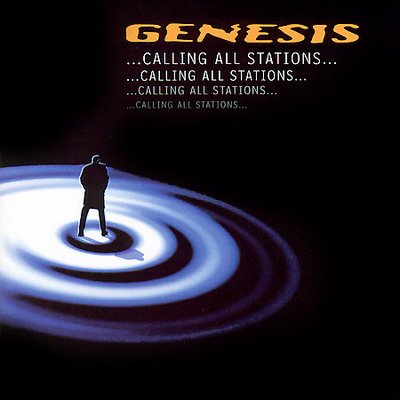
Calling All Stations (1997)

1.Calling All Stations
2.Congo
3.Shipwrecked
4.Alien Afternoon
5.Not About Us
6.If That's What You Need
7.The Dividing Line
8.Uncertain Weather
9.Small Talk
10.There Must Be Some Other Way
11.One Man's Fool
In the long and serpentine history of Genesis, Calling All Stations stands out as a particularly cruel twist of fate. It marked their fifteenth studio outing, nearly three decades into their career, and with it came the first full-length release absent their most recognizable voice and public face—Phil Collins. One might think that, having weathered seismic lineup changes before (with each reshuffle oddly propelling them to greater heights), the band might once again defy gravity. But this time, the parachute failed to open.
To be fair, the writing was already on the wall. Collins had officially stepped aside, citing a waning creative role within the band—curious, considering his overwhelming solo success outside of it. Meanwhile, Tony Banks and Mike Rutherford, the two remaining original members and primary architects of Genesis’ latter-day sound, chose to soldier on. Enter Ray Wilson, a capable vocalist best known for his work with the Scottish band Stiltskin. With two hired studio drummers and a fresh nameplate, Genesis returned to the studio, determined to breathe new life into an old machine.
But the result is, quite simply, their most uninspired effort.
From its opening bars, Calling All Stations meanders without momentum. There is little of the rhythmic spark or melodic ingenuity that once defined Genesis—whether in their early progressive days or their more streamlined, chart-conscious era. Much of the album plods along at a uniform mid-tempo, draped in dark atmospherics and absent the sort of dynamics that once made even their quieter moments sing. Worse still, many tracks collapse under their own lack of structure, often concluding with what can only be described as accidental fade-outs, as if the mixing engineer had simply grown tired and pushed a "fade" button.
Congo, the lead single, attempts a tribal-pop hybrid that quickly reveals itself as a creative dead end. Alien Afternoon and Small Talk fare no better, lumbering from verse to chorus with little conviction and even less melodic identity. There are moments—fleeting as they are—that suggest potential: Shipwrecked boasts a serviceable chorus, and The Dividing Line begins with promising instrumental heft before the vocals arrive to deflate it. But these are thin graces in a landscape otherwise parched for inspiration.
It’s difficult to pin the blame squarely. Ray Wilson is a competent singer, but he lacks the vocal character—whether Gabriel’s theatricality or Collins’ emotive punch—that had come to define the band. The material, meanwhile, bears all the hallmarks of late-career fatigue: overlong passages, lyrical blandness, and a stifling homogeneity in arrangement and tone. What’s most evident is the absence of the intangible chemistry that once bound the members together. Without it, the Genesis name feels borrowed—employed out of obligation, not identity.
The commercial and critical response was predictably tepid. The album did modest business in parts of Europe, but the U.S. leg of the accompanying tour was scrapped entirely due to lack of demand. Wilson, through no great fault of his own, was quietly dismissed shortly thereafter, and with him went the band’s final attempt to prolong its legacy.
Calling All Stations is sadly a creative nadir. Where earlier Genesis albums were marked by ambition and a willingness to take risks, this one is defined by absence: of spirit, of spark, and of the ineffable elements that once made them great.
Go back to the main page
Go To Next Review